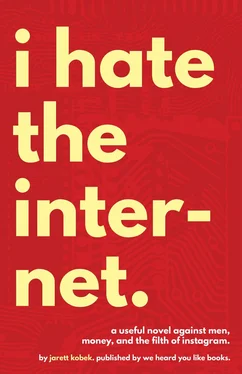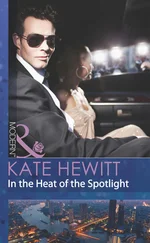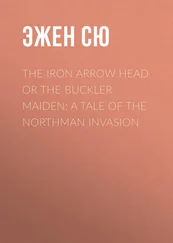Joel Silver, who didn’t have any eumelanin in the basale stratum of his epidermis, later said it was a mistake.
Adeline assumed it was intentional.
She’d spent most of her early life in Los Angeles. She always assumed the worst about Hollywood people. Anything to increase tracking.
The reveal of M. Abrahamovic Petrovitch as a woman belonging to the social construct of the White race was treated as the more interesting story than that of Jeremy Winterbloss as a man belonging to the social construct of the Black race.
Nearly ten years after finishing the last issue of Trill, Adeline was in demand. For her self, as her self. The details of her life became fodder for public discourse.
People were fascinated that she had lived through the grimy old East Village. People were interested that her best friend, Baby, was a gay writer of Science Fiction and the author of Annie Zero . People wanted to know how Adeline had kept the secret for so many years. People were fascinated by a woman working in genre comics and doing it so well. People were interested that she lived in San Francisco and wanted her opinions about the tech industry and the dotcom boom of the late 1990s.
Basically, she got kind of famous.
Despite never appearing as a character within its pages, Jack Kirby is the central personage of this novel. He died in 1994. He was born in 1917.
Jack Kirby is the central personage of this novel because he was the individual most screwed by the American comic book industry, and the American comic book industry is the perfect distillation of all the corrupt and venal behavior inherent in unregulated capitalism.
The business practices of the American comic book industry have colonized Twenty-First Century life. They are the tune to which we all dance.
The Internet, and the multinational conglomerates which rule it, have reduced everyone to the worst possible fate. We have become nothing more than comic book artists, churning out content for enormous monoliths that refuse to pay us the value of our work.
So we might as well revere the man who was screwed first and screwed hardest.
Jack Kirby was born Jacob Kurtzberg in 1917 at 147 Essex Street on the Lower East Side of Manhattan. He was a New York Jew at a time when being a Jew in America was a ticket to suspicion and abuse.
He was a creative genius working in a medium that disrespected the intelligence of its readers. He was a creative genius working in a medium that hid objectionable words behind strings of symbols like $#!+ and @$$.
He smoked cigars and he spoke in a Noo Yawk accent. He never graduated high school. He fought in World War Two. He was a Jew who wrote and drew comics about kicking the shit out of Nazis and then went to Germany and kicked the shit out of Nazis.
Whenever there was an important moment in American comic books, Jack Kirby was present. Always creating, always making new things, always with the new ideas.
He was one of the lamed vavniks, one of the thirty-six righteous who kept the world running.
Here is a list of some characters that he either created or co-created: Captain America, the Fantastic Four, the original X-Men, the Avengers, Thor, Loki, Iron Man, the Incredible Hulk, Doctor Doom, Galactus, Ant-Man, the Black Panther, Nick Fury, The Demon, Kamandi, Klarion the Witch Boy, OMAC, the New Gods, M.O.D.O.K, the Eternals, the Inhumans, the Forever People, the Newsboy Legion.
Here is a list of the above characters that he owned:
By the time that Adeline made her unforgivable mistake, Marvel Comics had transformed itself into Marvel Entertainment, which was a film production company. The films that Marvel produced were based on the comic books which it had published in earlier decades.
Marvel had released the following films: Iron Man, The Incredible Hulk, Iron Man 2, Captain America: The First Avenger, Thor, The Avengers, Iron Man 3. All of these films were based on intellectual property created by Jack Kirby.
Marvel had done $5,289,863,327 worth of box office business with films based on intellectual properties created by Jack Kirby. This does not include merchandizing or DVD/Blu-Ray sales.
This was more money than the respective annual GDPs of fifty countries.
Before Marvel transformed itself into a producer of films, the company was run by individuals of dubious business acumen.
These individuals had licensed away the media exploitation rights to many of Marvel’s best known intellectual properties, including the Fantastic Four and the X-Men, both of which were co-created by Jack Kirby.
The creation of the X-Men was complicated, but Kirby was there with the original concept. He did everything on the Fantastic Four.
By the time that Adeline committed the only unforgivable sin of the Twenty-First Century, the Fantastic Four and X-Men had been exploited in the production of eight films, seven of which were based on the work of Jack Kirby. These seven films had taken in $2,136,662,237 at the box office.
Combined with Marvel’s take of $5,289,863,327, this totaled out to $7,426,525,564 of business derived from media properties that Jack Kirby had either created or co-created.
Jack Kirby had worked-for-hire, when the prospect of billion dollar films of any kind, let alone those starring superheroes, was inconceivable.
Work-for-hire was one of the many bad deals that businesses offered to creative people. The terms of work-for-hire were: we pay you enough to eat and we keep everything you create.
So Jack Kirby had worked-for-hire and created a plethora of intellectual property which developed immense value while he himself held no legal ownership over that property.
He spent the last years of his life fighting with Marvel over his intellectual property and the return of his physical artwork. He went to his grave with no stake in his life’s work.
He got screwed.
Jack Kirby is also the central personage of this novel because this is not a good novel . This is a seriously mixed-up book with a central personage who never appears. The plot, like life, resolves into nothing and features emotional suffering without meaning.
The writer of this novel gave up trying to write good novels when he realized that the good novel , as an idea, was created by the Central Intelligence Agency.
This is not a joke. This is true. This is church.
The CIA funded the Paris Review . The CIA funded the Iowa Writer’s Workshop. The CIA engineered the 1958 Nobel Prize in Literature.
A person would be hard pressed to find three other institutions with more influence over the development of the good novel and literary fiction.
Literary fiction was a term used by the upper classes to suggest books which paired pointless sex with ruminations on the nature of mortgages were of greater merit than books which paired pointless sex with guns and violence.
The CIA funded literary fiction because people at the CIA believed that American literature was excellent propaganda and would help fight the Russians. People at the CIA believed that literary fiction would celebrate the delights of a middle class existence produced by American dynamism.
The people who took the CIA’s money were happy to help out.
The result was sixty years of good novels about the upper middle class and their sexual affairs.
Generally speaking, these good novels didn’t involve characters with much eumelanin in the basale strata of their epidermises.
A side effect of the CIA’s funding of the good novel was to ensure that American literature was hopeless at addressing the pace of technological innovation. This is because the defining quality of any good novel was the limit of its author’s imagination.
Читать дальше












